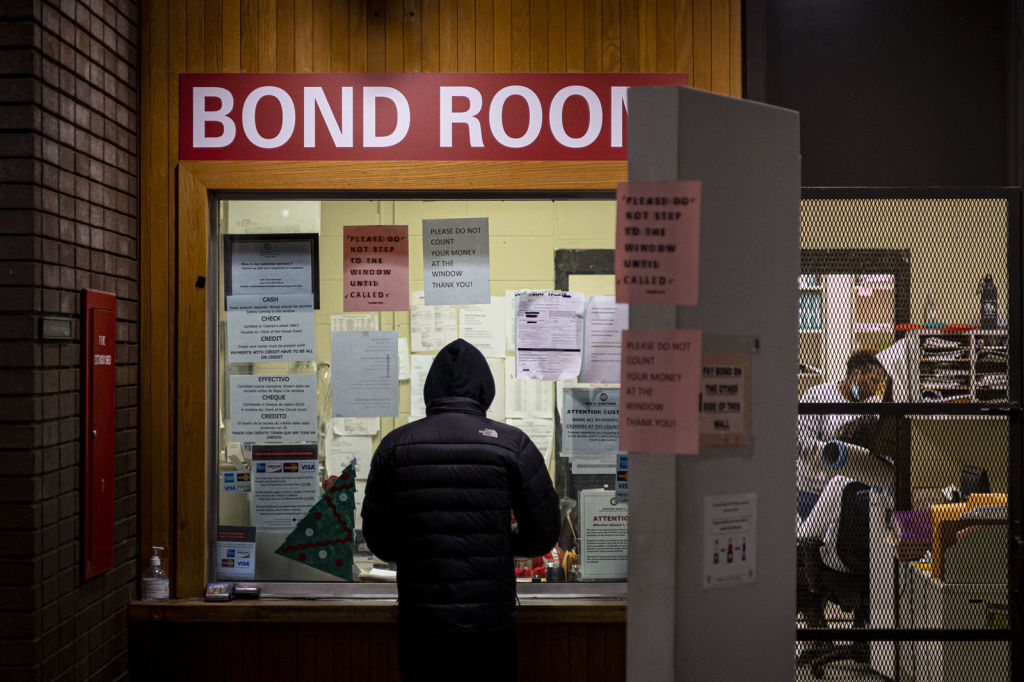
The vast majority of Americans agree on the principle of equal justice under the law. Yet, every day, in courthouses across the United States, the type of justice you get depends on how much money you have. On Sept. 18, 2023, Illinois took a historic step in the right direction as the Pretrial Fairness Act went into effect and the state became the first in the country to eliminate cash bail.
[time-brightcove not-tgx=”true”]
The Pretrial Fairness Act, a hard-won effort of impacted leaders, grassroots groups, and state-based advocacy organizations, including the Illinois Network for Pretrial Justice and the Coalition to End Money Bond, marks a historic milestone in strengthening due process and is an example for other states to follow.
On any given day in the U.S., about half a million people are held in jail not because they have been convicted of a crime, but merely to await court dates. These are legally innocent people, yet to face trial. The reason for their incarceration is as plain as it is unconstitutional: The cost of their freedom is unaffordable. The cash bail system, in putting a price tag on freedom, creates a two-tiered system of justice wherein those with enough resources are able to be released, while those without enough money in their pocket have no choice but to languish behind bars while their cases are pending. It is one of the biggest drivers of racial disparities in the criminal justice system and rapid growth in the jail population over the past three decades.
Under the Pretrial Fairness Act, cash is eliminated as a condition of pretrial release. While everyone accused of a crime is presumed eligible for release, judges maintain discretion to detain those accused of certain crimes, such as “forcible felonies” including first-degree murder and robbery, if deemed necessary. The Act brings comprehensive change to the pretrial system, for instance, by also regulating the use of pretrial algorithms in pretrial detention decisions and putting in place basic safeguards to limit the use of electronic monitoring.
In passing the Pretrial Fairness Act, Illinois is making a valiant effort to restore the presumption of innocence to the roughly 175,00 people that are incarcerated pretrial every year in the state. They are also joining a national movement to improve the criminal justice system by getting money out of it. From New Jersey to Santa Clara County, with many stops in between, jurisdictions are collectively reconsidering the role that cash bail plays in how judges decide who to free and who to detain at the pretrial stage—and are inching closer to a more fair and equal system.
Despite strong evidence that bail reform does not undermine public safety, false narratives and misinformation surround the debate on cash bail. Many people wrongly assume that bail is meant to be a punishment, rather than an incentive to return to court. In addition, critics argue that bail reform threatens public safety and contributes to violent crime; and this becomes a simplistic talking point, readily adopted by some politicians and media outlets. The pushback against the Pretrial Fairness Act began even before it went into effect, with prosecutors in the state launching a defensive campaign. We expect more of the same response to come with the implementation of the legislation.
Study after study shows, though, that cash bail reform does not lead to high crime rates, nor undermine public safety. In fact, the story in jurisdictions that have implemented bail reform reveals the contrary. While we can’t attribute causation, in New Jersey, which significantly reduced its reliance on cash bail in 2017, crime rates have plunged. The percentage of people that were arrested for new crimes while released pretrial remained essentially the same as before the reform was introduced. And, in the state, court appearance rates improved to 97%.
At The Bail Project, we’ve provided free bail assistance for nearly 30,000 low-income people. But we don’t stop there: through our model of Community Release with Support, we provide supportive services such as text notifications and court transportation. Our clients return to over 90% of their court dates. This evidence puts a nail in the coffin for the argument that having money on the line is what determines whether someone will return to court. In Chicago, as the Pretrial Fairness Act goes into effect, we’re working in partnership with the Lawndale Christian Legal Center to scale this model.
Evidence continues to mount, pointing to the benefits of cash bail reform in strengthening due process, improving racial equity, and pushing us to focus on creating better social policies to address the root causes of crime, particularly those that intersect with matters of mental health, substance use, and homelessness. Other jurisdictions are taking note and pushing for similar change. Legislators in Michigan, for instance, are considering scaling back their use of cash bail. For now, though, all eyes are on Illinois.
The post What the Rest of America Can Learn From Illinois on Criminal Justice Reform first appeared on The News And Times – thenewsandtimes.com.
